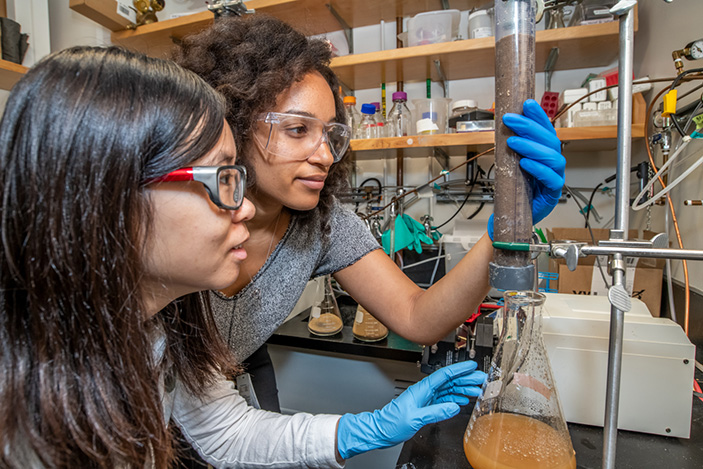Five collaborative programs between Berkeley Lab and institutions serving historically underrepresented communities received Reaching a New Energy Sciences Workforce (RENEW) funding awards from the U.S. Department of Energy (DOE) Office of Science. RENEW is a DOE Office of Science initiative designed to build a foundation for research and education at institutions historically underrepresented in the Office’s research portfolio. The funding program leverages the unique capabilities of national laboratories, user facilities, and other research infrastructures to provide undergraduate and graduate students with hands-on training, mentoring, and networking opportunities.
All of the programs awarded to Berkeley Lab are led by minority or historically underrepresented institutions.
“The RENEW program builds important foundations for research at institutions historically not well represented in the science and technology ecosystem. These RENEW awards are also important to our own strategies for building partnerships. Through these efforts, we can help train the next generation of scientists, and not leave any talent behind,” said Carol Burns, deputy laboratory director for research at Berkeley Lab.
Below are descriptions of the awarded programs:
Energizing a student program on bioenergy
As the demand for energy grows, so does the need for research into biofuels and other bioproducts. To meet this need, researchers from Alabama A&M University (AAMU), the University of Illinois Urbana-Champaign, and the Hudson Alpha Institute for Biotechnology, in collaboration with scientists from the DOE Joint Genome Institute (JGI), a national user facility at Berkeley Lab, are initiating a new research and education program focused on bioenergy. The team, which includes the JGI’s senior scientist John Vogel and research scientist Sharon Greenblum, will establish and maintain field trials of bioenergy crops, as well as the genomics and phenomics tools to study them. The program will allow underrepresented minority students to work hands-on in these areas with state-of-the-art research equipment as well as networking opportunities to enrich their careers. Overall, this project will become the foundation for a long-term, ongoing training program for underrepresented individuals in the evolving bioenergy and bioproducts sector.
Catalyzing student education through watershed analysis
Extreme floods, droughts, and wildfires are becoming more common in the Colorado River Basin, and elsewhere. Climate change exacerbates these conditions and affects water availability for cities, agricultural lands, and associated ecosystems in the basin. A collaboration of researchers from California State University Los Angeles (Cal State LA), SLAC National Laboratory, and Berkeley Lab aims to understand how these changes affect water flow and water chemistry in the Upper Colorado River Basin and feeder basins receiving imported water from the Colorado River. The project will leverage new opportunities and research directions within the Watershed Function Scientific Focus Area (SFA) in the East River Watershed of the Upper Colorado River Basin and will extend work into end-user basins in Southern California, including the Los Angeles River Watershed. The Earth and Environmental Sciences Area’s Michelle Newcomer, research scientist, and senior scientists Eoin Brodie and Kenneth Williams will be leading the Lab’s efforts. The project will engage students from Hispanic and other underrepresented communities to foster a sense of belonging and cultivate a scientific identity through independent projects.
“Growing” a new workforce through research on sustainable arid vegetation
Climate change in the southern U.S. is already impacting current agricultural efforts and will bring additional problems resulting from water supply, devastating weather patterns, and air pollution. To address these issues, researchers from San Diego State University are collaborating with Berkeley Lab’s Deepika Awasthi, a research scientist at the Joint BioEnergy Institute (JBEI), and the Pacific Northwest National Laboratory on a research and education project for climate-smart agriculture solutions. The program aims to transform current agricultural practices by understanding and harnessing how soil microbiomes drive plant growth. The educational aspect of the project focuses on equipping students from historically marginalized communities with advanced experimental, computational, and mathematical skills. These skills will prepare students to play a critical role in the project’s research while preparing them for careers in the growing field of bio-based innovation and biotechnology.
Empowering students by bridging data science and genomics research
With the emergence of new genomic and computational technologies that can address critical challenges in energy and environmental research, the demand for a workforce trained in both biological and data sciences has grown. The “Building Bridges, Empowering Students: Data Science and Genomics Training for the Energy Sciences Workforce” program, conducted by the University of California, Merced, in collaboration with Berkeley Lab, offers undergraduate and graduate students the opportunity to bridge these two areas of research. The program is based on a 10-year standing collaboration and the team includes JGI staff scientist Zhong Wang. In this program, students are matched with mentors and projects to provide hands-on experience in genomic research and apply experimental and computational tools to solve problems in computational biology and genomics.
“Entangling” students with quantum bit (qubit) research
Quantum computing is poised to transform information technology and our understanding of information. To participate in the international race to find the best quantum bits (qubits), which are at the heart of any quantum computer, the University of Hawai’i at Mānoa and Berkeley Lab have launched a new student program. Thomas Schenkel, a senior scientist in the Lab’s Physical Sciences Area, will lead the Lab’s efforts in this program, which will allow undergraduate and graduate students to gain valuable experience and knowledge for their future careers. Students will be part of teams that come full circle from model predictions, perform experiments, analyze qubit samples, compare with model predictions, and publish results. In addition to the technological aspects of the exchange, the program will bring a more diverse experience and perspective to the national laboratory environment.
In 2022, the Lab received RENEW funding awards for five different programs. Three of these awards were granted to Earth and Environmental Sciences Area’s Ken Williams, Benjamin Gilbert, and Alan Rhoades respectively. One project was awarded to Bert de Jong from the Computing Sciences Area and one project to Mark Asta, Peter Hosemann, Dula Parkinson, and Gregory Su from the Energy Sciences Area.
